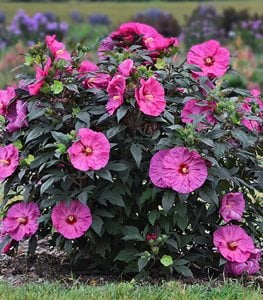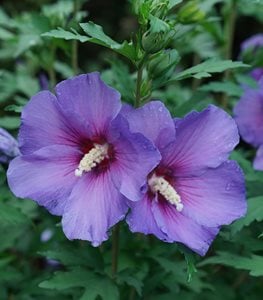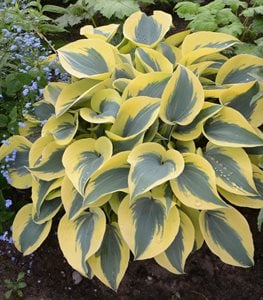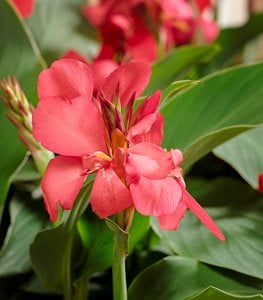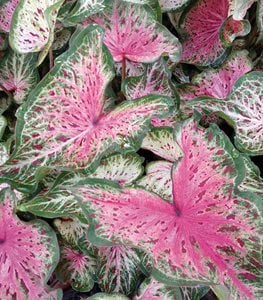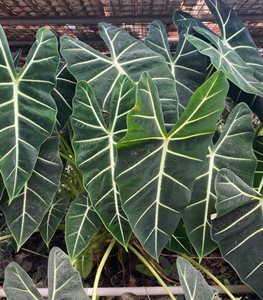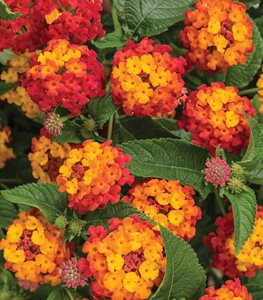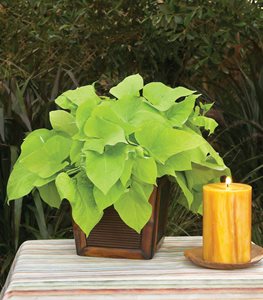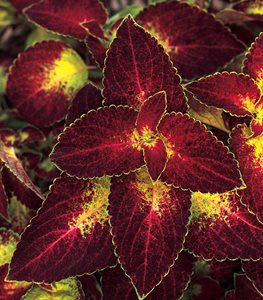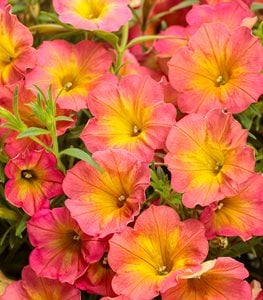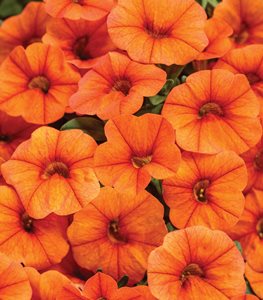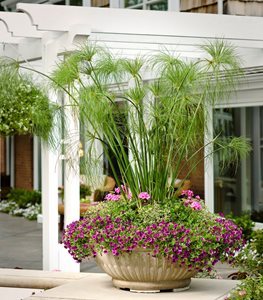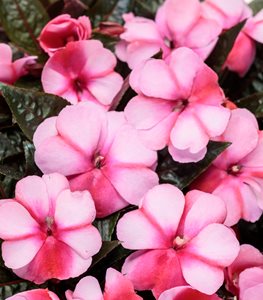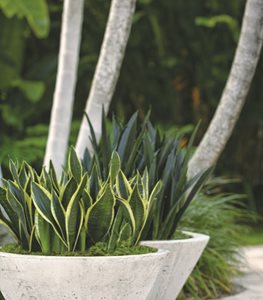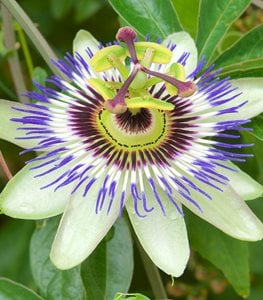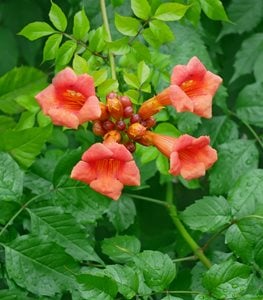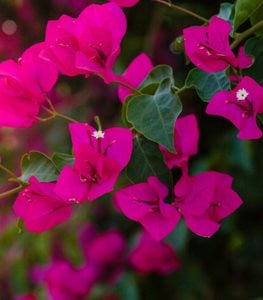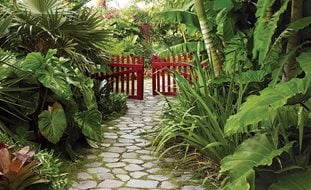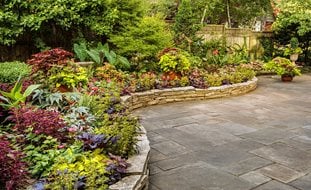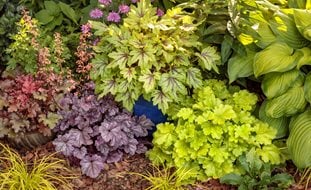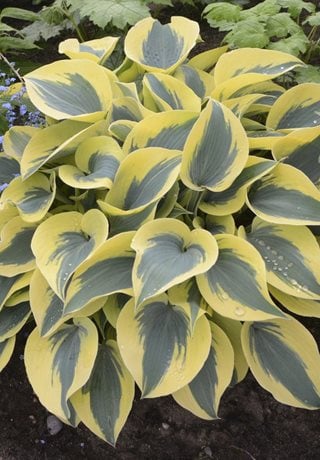Tropical Flowers & Plants For Your Garden
See 17 plants that can help create a tropical garden style in your own backyard Published 8/26/2022Even if you don’t live in a tropical location, you can still have a tropical garden by using the right plants. When choosing your plants, rather than looking for ones typically found in tropical climates, focus on looking for plants with the qualities you want: vibrant blooms and foliage that that are large and bright. Here, we offer 17 plant types to help you achieve your at-home “getaway.”
ROSE MALLOW (Hibiscus moscheutos)
Zones: 5-9
Exposure: Full sun
Height/Spread: 3 to 8 feet tall, 2 to 5 feet wide
With its eye-catching blooms that flower from early spring to first frost, Hibiscus moschuetos is a wonderful option for adding tropical flair in cold climates. Flowers are large, some varieties reaching up to 8 inches in width.
Learn more about growing rose mallow.
Pictured: Summerific® 'Berry Awesome' rose mallow from Proven Winners.
ROSE OF SHARON (Hibiscus syriacus)
Zones: 5-9, with some exceptions
Exposure: Full sun to partial afternoon shade (best flowering in full sun)
Height/Spread: 8 to 12 feet tall, 6 to 10 feet wide, depending on the variety
Another hibiscus that offers exotic floral beauty in cold climates, Hibiscus syriacus is a shrub with flowers in shades of white, pink, red, and purple.
Learn more about growing rose of Sharon.
Pictured: Paraplu Violet® rose of Sharon from Proven Winners.
HOSTA (Hosta spp.)
Zones: 3-9
Exposure: Dappled or partial shade
Height/Spread: From 6 to 8 inches tall and 18 to 24 inches wide, to 48 inches tall and 6 feet wide
Hostas are popular foliage plants good for livening up shady gardens, even in locations with chilly winter weather.
Learn more about growing hosta.
Pictured: Shadowland® ‘Autumn Frost’ hosta from Proven Winners.
CANNA (Canna spp.)
Zones: 8-10
Exposure: Partial shade to full sun
Height: From 18 inches to over 6 feet tall, depending on the variety
Its spectacular leaves are only half of what this plant has to offer—blooms that show off all summer long make cannas a welcome addition to any tropical garden.
Learn more about growing canna.
Pictured: Toucan® Coral canna lily from Proven Winners.
CALADIUM (Caladium spp.)
Zones: 9-11
Exposure: Bright, indirect light, especially for varieties with white coloring
Height: 18 to 24 inches; dwarf forms under 12" are also available
Another plant with leaves that come in striking colors, caladiums are popular for shady or semi-shady gardens—and some newer varieties are also sun tolerant.
Learn more about growing caladium.
Pictured: Heart to Heart® ‘Heart and Soul’ caladium from Proven Winners.
ALOCASIA (Alocasia spp.)
Zones: 9-11
Exposure: Bright, indirect light
Height: Typically 2 to 6 feet tall and wide when grown inside
Notable for their heart- or arrow-shaped leaves, Alocasia bring an exotic look to the garden. If you like their shape but don’t necessarily want something so big, there are smaller varieties, too—leaf sizes can can range from a couple of inches to nearly 3 feet.
Pictured: Alocasia micholitziana ‘Frydek’
LANTANA (Lantana spp.)
Zones: 9-11
Exposure: Full sun
Height/Spread: 2 to 6 feet tall and 3 to 10 feet wide when grown as a perennial; 3 to 4 feet tall and 1 to 3 feet wide when grown as an annual
These floriferous, hardy shrubs come in a wide variety of colors, many of them fitting into the “tropical” theme.
Learn more about growing lantana.
Pictured: Luscious® Citrus Blend™ lantana from Proven Winners
SWEET POTATO VINE (Ipomoea batatas)
Zones: 11, or grown as annual
Exposure: Best with at least 6 hours of full sun, they can take some shade
Height/Spread: 6 to 16 inches tall, 3 to 6 feet wide, up to 10 feet long
Leafy annuals, ranging in colors from lime green to deep maroon—some have streaks of white or pink.
Learn more about growing sweet potato vine.
Pictured: Proven Accents® Margarita sweet potato vine from Proven Winners
COLEUS (Solenostemon spp.)
Zones: 10-11, or grown as annual
Exposure: Full sun to shade, depending on variety
Height/Spread: Varieties 6 inches to 3-1/2 feet tall and 1 to 3 feet wide
These beauties do bloom, but many gardeners love them most for their foliage. Like sweet potato vine, they range in colors. Can be planted in sun or shade.
Learn more about growing coleus.
Pictured: ColorBlaze® Dipt in Wine coleus from Proven Winners
PETUNIA (Petunia spp.)
Zones: Grown as annual
Exposure: Part sun to sun
Height/Spread: Up to 2' tall and 3' wide
Especially when paired with the right tropical foliage, Supertunias in bright yellows, pinks, and oranges are a great fit for tropical gardens. These annuals last from early spring until late fall, so they’ll give you plenty of color all summer long.
Learn more about growing petunias.
Pictured: Supertunia® Persimmon petunia from Proven Winners
CALIBRACHOA (Calibrachoa spp.)
Zones: 9-11, or grown as annual
Exposure: Full sun, can tolerate partial shade
Height/Spread: 6 to 12 inches tall and 12 to 24 inches wide
Offering blooms all summer long, calibrachoa are most often used in hanging baskets and containers.
Learn more about growing calibrachoa.
Pictured: Superbells® Dreamsicle® calibrachoa from Proven Winners
PAPYRUS (Cyperus papyrus)
Zones: 10-11, or grown as an annual
Exposure: Full sun, but can tolerate partial sun
Height/Spread: Reaches up to 6 feet tall and spreads up to 4 feet
This fast-growing plant loves wet soil, so make sure to keep it in a spot that won’t dry out. In fact, it’s a great plant next to garden ponds or bogs. Its attention-grabbing umbels bring a unique texture to the garden.
Pictured: Graceful Grasses® King Tut® from Proven Winners
NEW GUINEA IMPATIENS (Impatiens hawkeri)
Zones: 10-11, or grown as an annual
Exposure: Likes light to medium shade, but tolerates sun
Height/Spread: Depending on the variety, can reach anywhere from 1 to 3 feet tall and about 2 feet wide
Unlike other varieties of impatiens, New Guinea impatiens tolerate sunny locations as long as you keep their roots consistently moist. Blooming from late spring until first frost, these beauties provide color in the garden all summer.
Learn more about growing New Guinea impatiens.
Pictured: Infinity® Blushing Crimson from Proven Winners
SNAKE PLANT (Sansevieria trifasciata)
Zones: 9-10, or grown as an annual or houseplant
Exposure: Doesn’t like direct sun, but thrives when it receives some light
Height/Spread: Varieties range from 6 inches to 4 feet in height
Its love for light but not direct sun makes this a perfect plant for pots in a tropical-themed patio area. Though beloved by gardeners for being easy to propagate, snake plants can be toxic when ingested, so be mindful of their placement and proximity to pets and children.
Pictured: ‘Futura Simplex’ and ‘Nelsoni’
PASSIONFLOWER (Passiflora spp.)
Zones: 5-11
Exposure: Full sun to partial shade
Height/Spread: 6 to 30 feet tall, 3 to 6 feet wide
The exotic blooms of passionflower are multi-layered, with a base of rounded petals topped by a collar of thin radiating filaments, and a vertical antennae-like center. Flowers, which bloom from summer into fall, are purple, blue, red, pink, green, white, or multi-colored. This vigorous quick-growing vine, which attaches itself with twining stems, can be used as a screen to cover a fence or arbor.
NOTE: Can be invasive in warmer regions.
TRUMPET VINE (Campsis radicans)
Zones: 4-9
Exposure: Full sun to partial shade
Height/Spread: 20 to 40 feet tall, 5 to 10 feet wide
Lush serrated foliage provides an attractive backdrop to clusters of large funnel-shaped flowers in colors of red, orange, or yellow that appear in summer and attract hummingbirds and butterflies. This deciduous vine, which attaches itself with its aerial roots, can be used as screening on an arbor or pergola large enough support its weight.
NOTE: This fast-growing vine can be invasive in warmer regions, spreading by seed and underground runners.
BOUGAINVILLEA (Bougainvillea spp.)
Zones: 9-12
Exposure: Full sun
Height/Spread: 2 to 30 feet tall and wide
This tropical vine is a popular choice in frost-free regions for its prolific bloom and carefree nature. Plants bloom nearly year-round, with clusters of flowers in bright hues of pink, orange, coral, red, yellow, orange, and occasionally white. This vigorous woody vine, which attaches itself via its twining stems, needs strong support and regular pruning to keep it in check. Grow along a wall, arbor, or pergola, or use as a low-maintenance groundcover. In cooler climates, smaller specimens can be grown in a hanging basket or container and overwintered indoors.
Learn more about growing bougainvillea.

